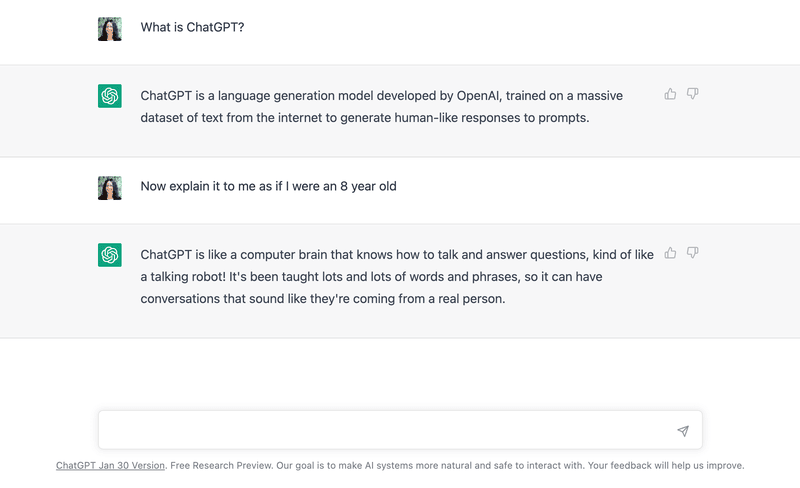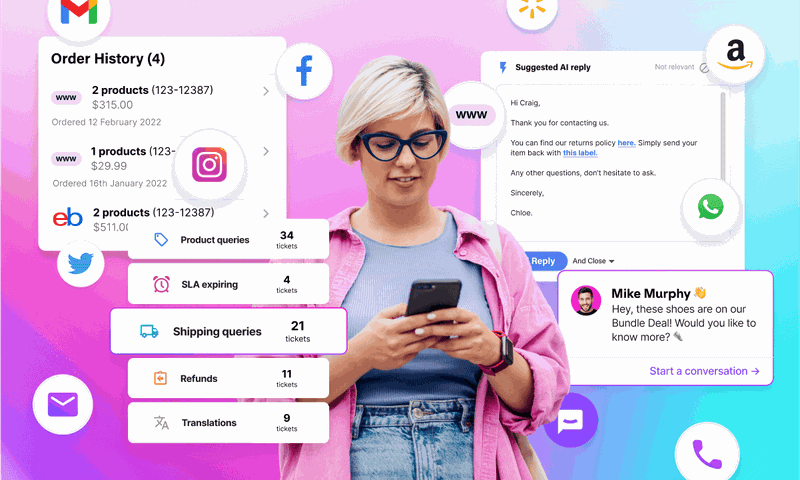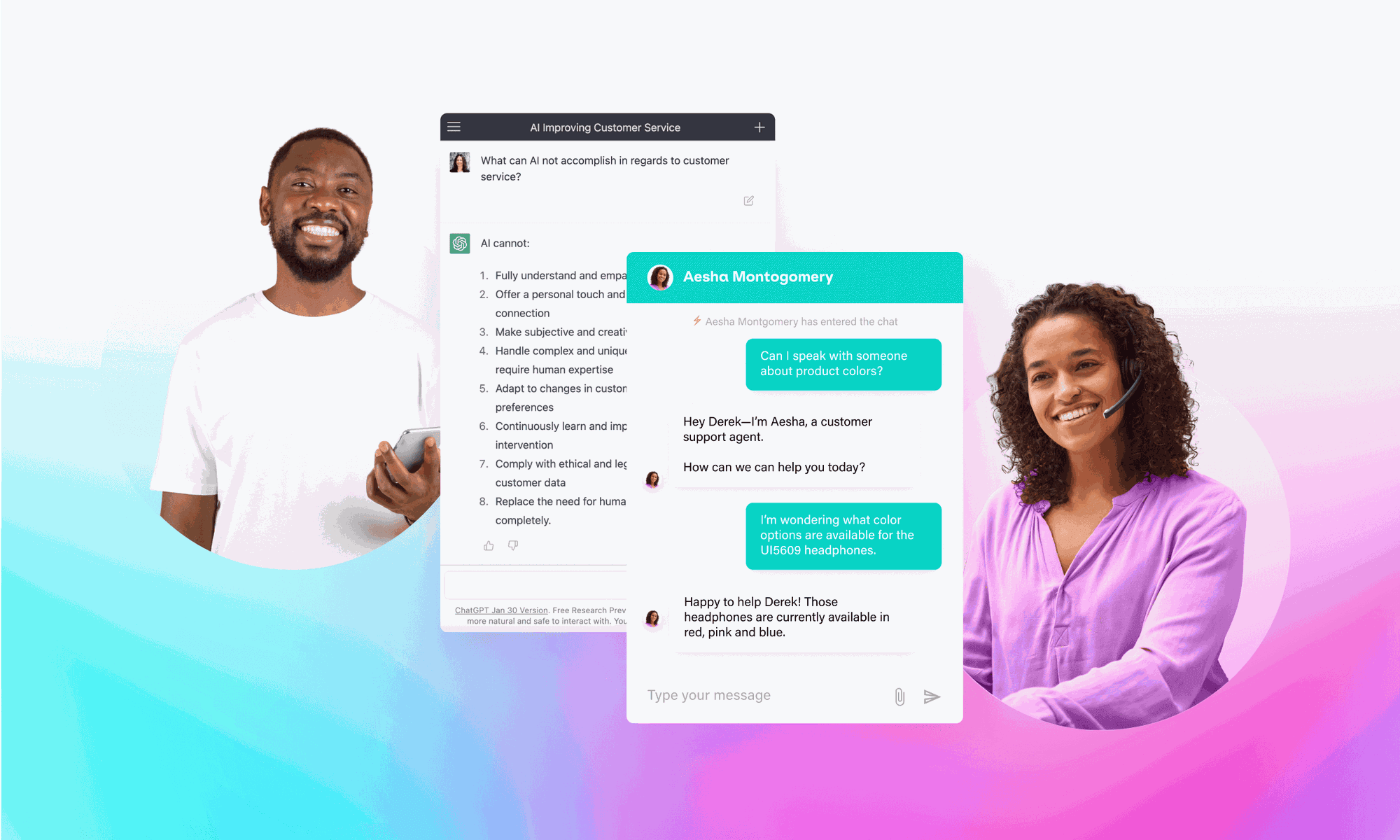No matter what industry you’re in today, it seems ChatGPT is going to have major implications for how you do business—and the eCommerce space is no different. In fact you may be reading this blog with one question on your mind, “Will ChatGPT replace humans in customer service?”
The short answer is, no. Using ChatGPT for eCommerce customer service today would not deliver the exceptional and accurate responses your customers need or expect. The AI has some serious limitations (as outlined by its makers) that would require human intervention to fact-check answers.
- ChatGPT sometimes writes plausible-sounding but incorrect or nonsensical answers.
- ChatGPT is sensitive to tweaks to the input phrasing or attempting the same prompt multiple times.
With that said, it’s clear that ChatGPT or some other AI such as Google’s own answer to it, will influence how customer service is handled in eCommerce.
Let’s dive a little deeper.
What is ChatGPT?
ChatGPT is a pre-trained language generation model developed by OpenAI which excels at interacting in a conversational way. Think of it as a very clever computer friend who can understand and respond to questions in the blink of an eye.
There is no question that ChatGPT is incredibly impressive. You can ask it something, respond to the answer given and continue the conversation in a natural way, as you would with a real person. As it has vast amounts of data at its disposal, it can deliver astounding responses and content with incredible speed and relevance. It can even write code!
Used correctly, it can offer new suggestions or perspectives on your own thoughts, quickly offer answers to questions in a conversational way and do some heavy lifting at the beginning of many different projects, but its accuracy is often taken for granted and that’s when things start to unravel.

The limitations of ChatGPT
ChatGPT accesses its training data, which consists of text from a diverse range of sources including the internet, books, and other texts, to generate its responses, but the data used to train the model is current as of 2021, so anything beyond that, it knows nothing about.
I asked ChatGPT what its own limitations were and it responded in kind:
- Bias: The model has been trained on text data from the internet and other sources, which may contain biases and stereotypes.
- Contextual Understanding: Although ChatGPT has been trained on a large amount of text, it may not always understand the context of a conversation and may produce irrelevant responses.
- Lack of Common Sense: ChatGPT lacks common sense knowledge and may provide absurd answers to questions that require real-world understanding.
- Limited Domain Knowledge: ChatGPT has been trained on a wide range of topics but may not have detailed knowledge in specific domains and may provide incorrect information.
- Inaccurate Information: ChatGPT is only as accurate as its training data, and it may provide information that is outdated or incorrect.
So in the context of delivering exceptional customer service, ChatGPT cannot access your knowledge base or internal systems. Any answers it gives are derived from publicly accessible information.
AI powered customer service in eCommerce is already here!
If we were to examine ChatGPT versus a human customer service agent today, there simply isn’t any comparison…
Now there’s a distinction I want to make here for such a comparison. In the context of eCommerce customer service, I’ll assume that the customer service agent is using a helpdesk actually built for eCommerce, such as eDesk.
In that scenario, ChatGPT can’t:
- Suggest possible responses to a customer’s query that takes into account the order, shipping, product and customer details
- Automatically insert order, shipping, product and customer information into a highly relevant response to a customer
- It can’t access professionally written templated responses for the most common eCommerce queries
- It can’t see a customer’s buying and support history with your brand to quickly determine what the most appropriate response should be
- It can’t automatically group, prioritise, tag and assign incoming tickets so the right agent always deals with the right ticket
- It can’t connect to your entire eCommerce stack to bring all the information front and centre to determine what the best course of action is for the customer
- Begin proactive conversations based on your prospective buyer’s website activity
- It can’t be a human being when all the customer on the other end of the conversation wants is a listening, understanding ear.
Yes, all of the above is achievable today in eDesk. It’s what AI can do right now for eCommerce support teams. It’s not some fancy pipe dream. It’s not trying to replace human beings—it’s automating every part of customer service that can and should be automated to free agents’ time to be helpful people and deliver exceptional support to online buyers.

The future of AI in eCommerce customer service
Using ChatGPT in eCommerce customer service will evolve over the coming months and years. Google’s entry into the space will accelerate progress, and we’ll be continuously asking, “How can AI improve customer service?”
Of course, there isn’t one answer here—in fact many professionals in the customer service space have given their thoughts, but I have some thoughts on how eCommerce businesses should think about this space.
AI-powered customer service will only get better
And as it does, those businesses who seek to deliver the most helpful answers to their customers will stand head and shoulders above the competition. As technology powers ‘new normals’ entrepreneurs and forward looking businesses will always seek differentiation. In a world of automation, brands will seek to stand out with human narratives and stories. Efficiency matters but it should never remove our ability to ‘talk to someone’.
The human touch that builds trust
On some level, AI will be able to suggest the right product, quickly guide you to the right answer and help automate behind the scenes things that computers are more efficient at than humans.
But…
A computer will never be able to tell you that it remembers taking its children on a camping holiday and how ‘that tent’ was the difference between a terrible holiday and a brilliant holiday. A computer can’t recall driving an old Opel Kadett at 17 that made you feel like you were driving a Mustang because the exhaust was broken and noisy.
These are stories and conversations that can happen during a sales process that help build brands. Sure, ChatGPT could probably invent a story but trust and honesty matter. As humans, we gravitate towards humans. We love efficiency and are happy with AI to be involved in delivering that efficiency, but when I want to speak to a person, don’t pretend one is there if it’s really a sophisticated bot.
Going off script to do the right thing
Sometimes in life, you just have to do what you think is right. Whilst we have our brand guidelines, tone of voice, and procedures to follow, it’s okay to just be a compassionate human being.
What AI would write the following to a customer who bought balloons to celebrate the end of her mum’s chemotherapy?
Hi Shannon, We have refunded your order because we agree with your balloons! Do not worry, the balloons are still on the way for you, use the refunded money to get some cake.

It’s not AI versus customer service agent—it’s both!
Using ChatGPT for eCommerce customer service will not replace your amazing support people but it may help them become more efficient through better automations and reporting and free up time so they can be where customers need them.
Want to learn more about how eDesk can automate your customer service?
The acceleration of improvements to AI and language models will inevitably lead to more prominence of the technology in the eCommerce customer service space, but we have to keep customers’ needs at the forefront of any changes.
AI should drive efficiencies that improve the customer and agent experience, as it does right now today in eDesk, but when your customers ‘just wants to speak to a real person’ make sure you’ve got an amazing team of support people on hand across the channels your customers are on.

